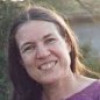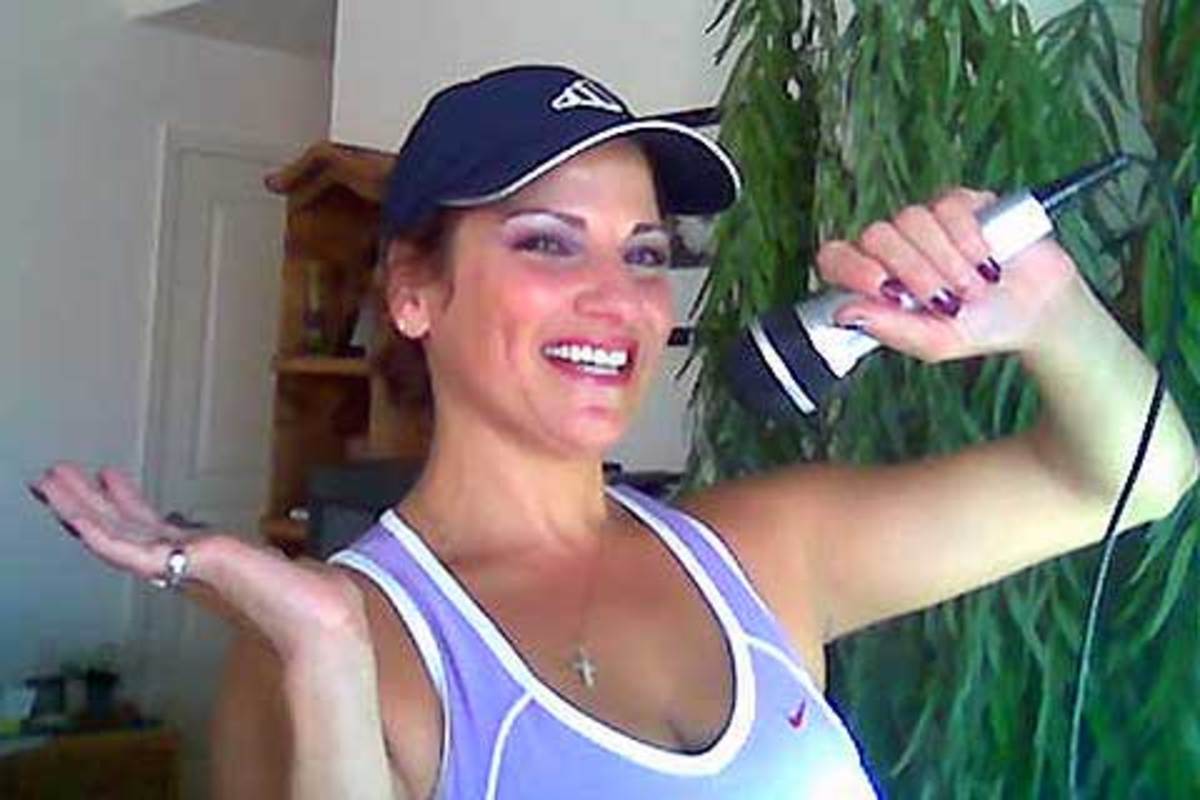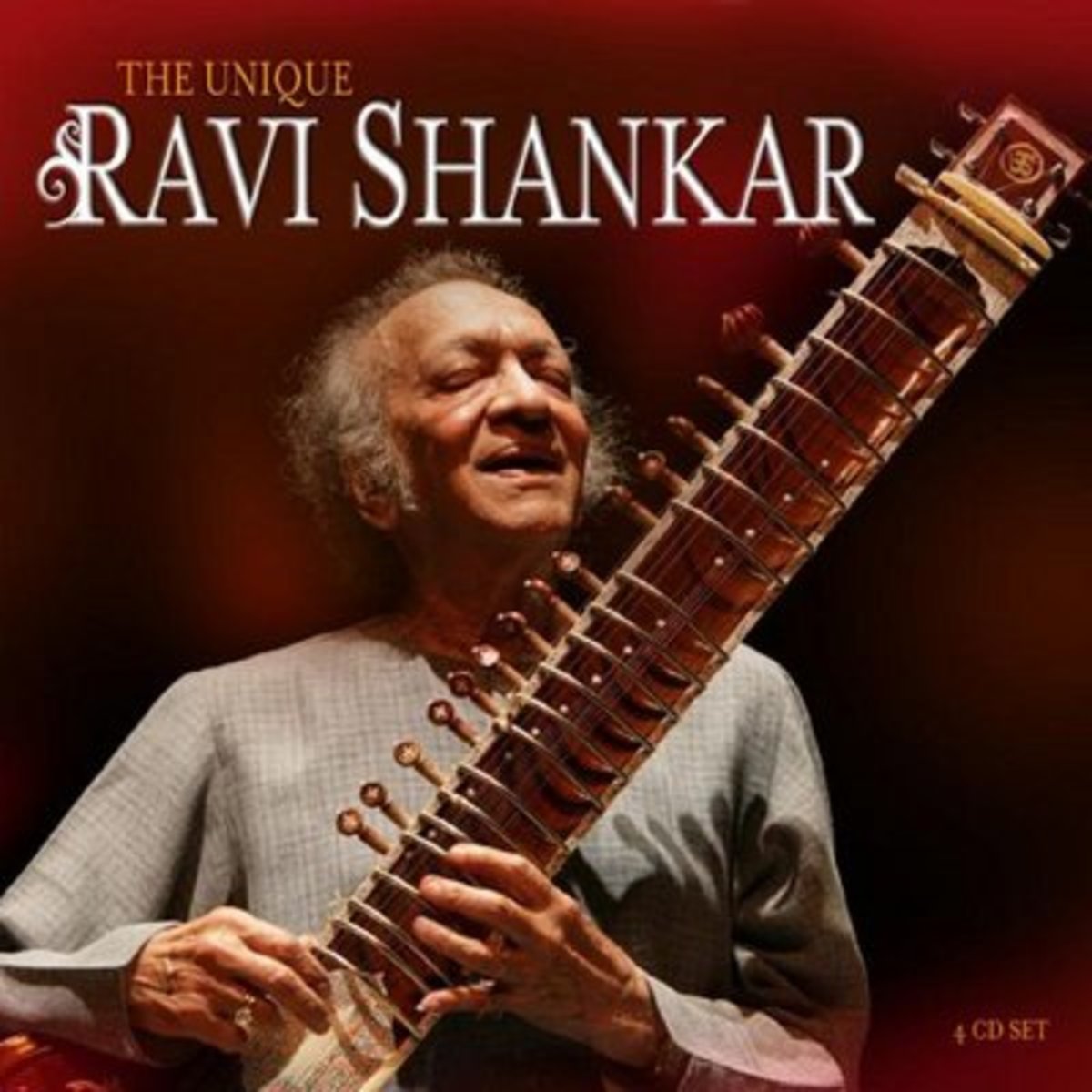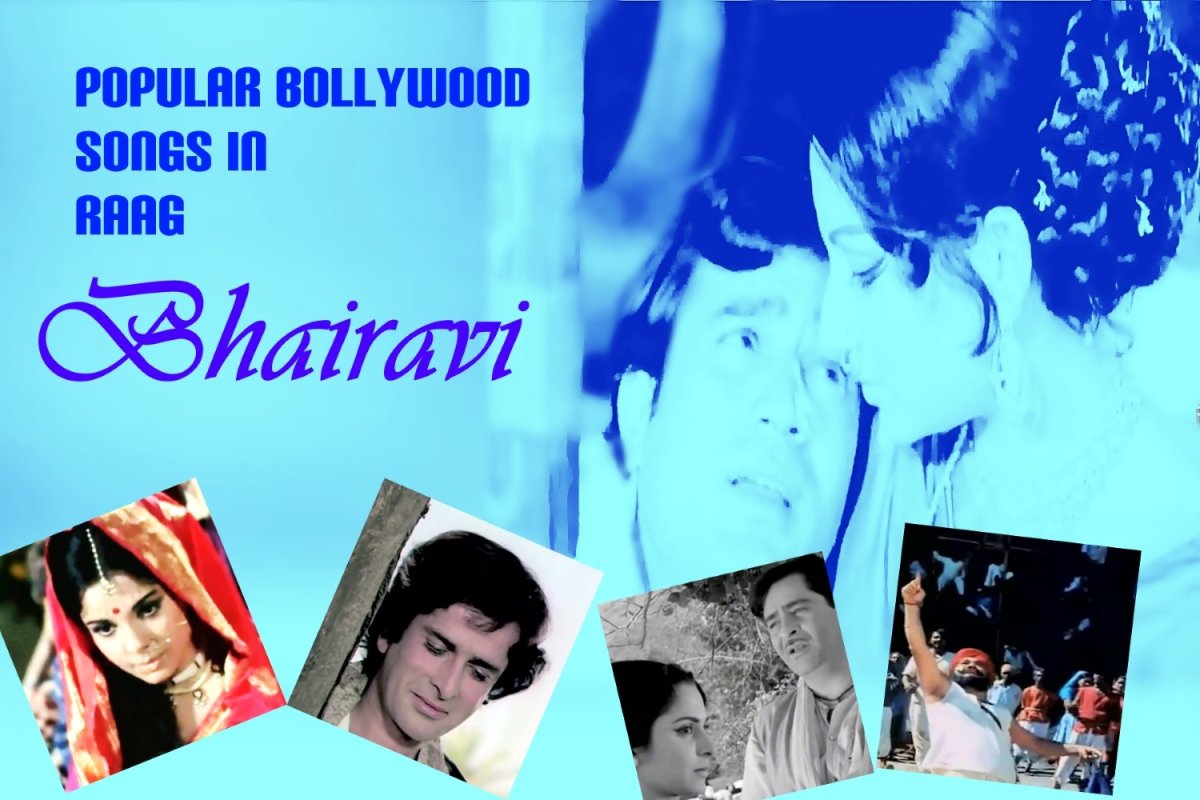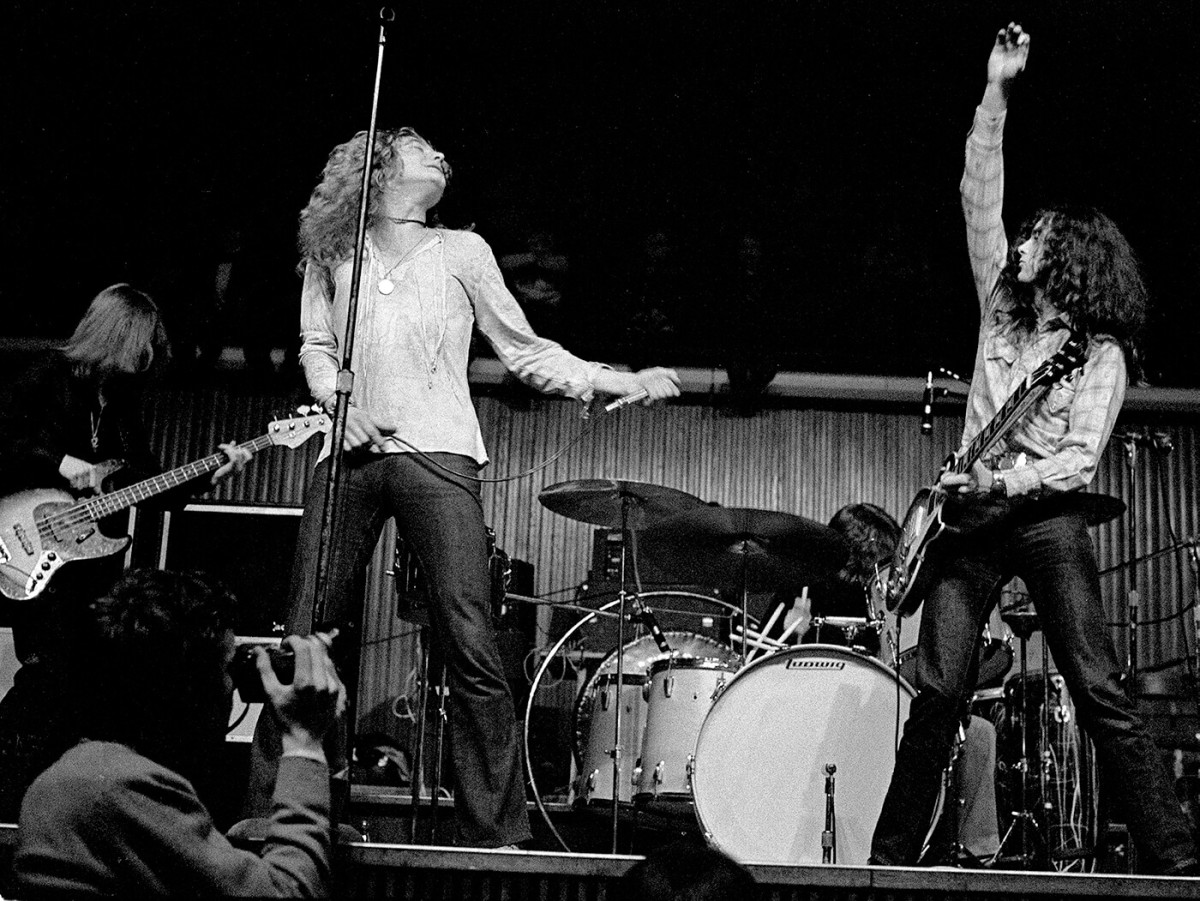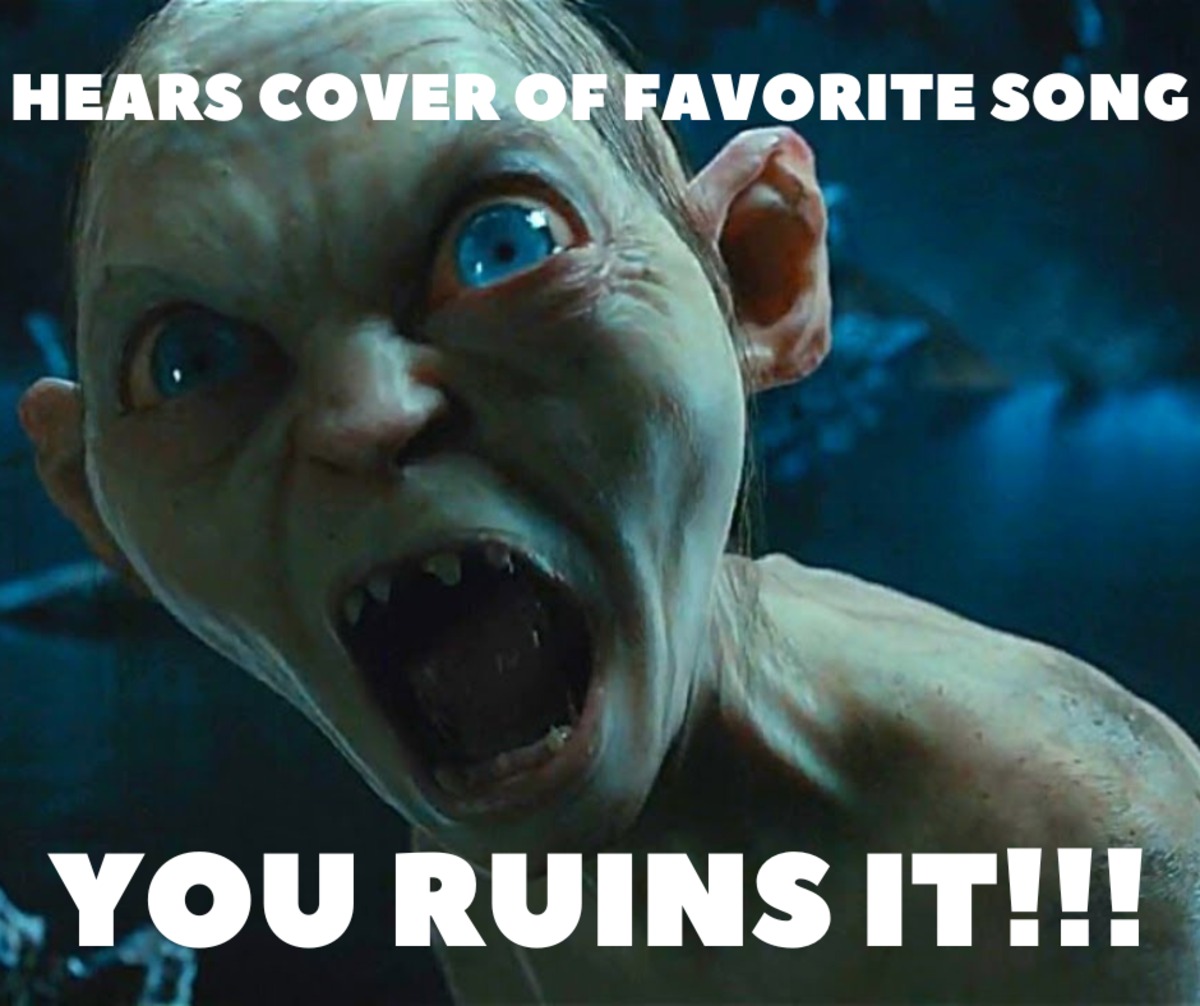My Piano
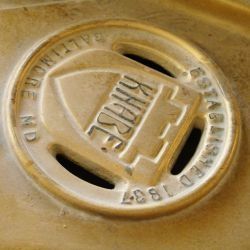
An Odyssey
Being a history of my experiences as a musician, starting at age 3, on into motherhood, and passing it on.
My mother tells me that when I was only 3, I would sing the Lord's Prayer, in tune. I remember singing in church before I learned how to read, by waiting a split second to see what everyone else sang, both pitch and word, and then singing with them. This was the seed for what happened throughout my life, at least so far.
Every Saturday, we listened to the Metropolitan Opera on the radio. It was the only classical music we could get on the radio. Every Sunday, we went to church and heard excellent church music. My mother would play the piano, and I got to listen.
My life is my musical experience, and I will share it with you.
All photos by me unless otherwise noted. This photo is the logo of the Knabe company, which made the piano I own.
The Beginning
It really started with my mother. She grew in a small German community in Texas. When she was 14, she wanted desperately to start taking music lessons, and somehow, she was able to manage it. She was soon playing for church services.
When my parents met, my father was in the Army. It was during WWII. He was 10 years older than she, and the Army was getting ready to ship him out to someplace. So they only knew each other three months when they got married.
I don't remember for sure, but I think my father already had the family's first piano, a Wurlitzer spinet. My aunt won it in a raffle, and my father wanted to buy it from her. He offered her $100, and she wanted $125. My father said, "If I can get it into my car, I'll pay you $100." She agreed, and he got it in his car (in those days, cars were built much differently than today.)
My earliest memory was when we moved from a duplex to the house two doors down. I remember the movers carrying that piano across the lawn.
My Beginnings
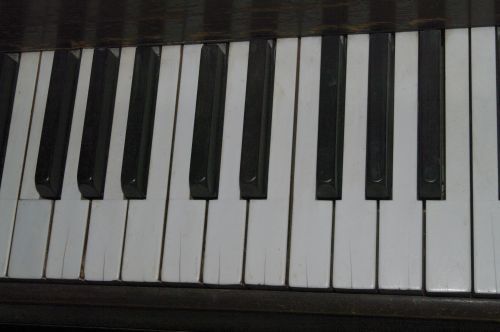
I started studying the piano at the age of 3. My mother was my teacher. She tells me that I would ask her to play the new piece for me, and she would do it once, and I would have it memorized. When she figured out what I was doing, she stopped playing it for me, because she wanted me to learn to read music. As painful as that was (reading music has never been one of my better skills), I am glad she did.
Not long after, I started studying under a kindly lady. My first recital piece was "O Holy Night" arranged for piano.
Once we moved to another town, I didn't have any more piano lessons for awhile. Eventually, we moved again, and I was able to study under Dr. William T. Timmings. He was quite an interesting character. He had scrounged old, discarded pipe organs that he got from churches that were replacing their organs, and he had built a 2000 pipe organ in his home. The second floor of the home was full of pipes, and the 32' ones went down the hall. There was grillwork in the ceiling of the den, and the console was beneath. He once played that for me, and it was magnificent!
Dr. Timmings was our choir director at church. Because he played for services at another church, we sang without a director on Sunday, and he rehearsed with us on Thursday.
He had some very interesting stories. One was his description of how his mother used to treat sore throats in his family. She would take a turkey feather, dip it in kerosene, and "gonk, gonk, gonk" with appropriate hand motions demonstrating, she would swab their throats.
Another time, when he was giving me a lesson, I asked him why his pencils were always only two inches long. He said anything longer was too much lumber.
He taught me one practice technique that was priceless. He said, if I was having a problem with a section of the piece, I should play just that section, over and over until I got it perfect ten times in a row, and then it would become the strongest part of the piece. I have used that technique with great success not only in music, but also martial arts.
The photo is of the keyboard of my piano.
What Happened Next
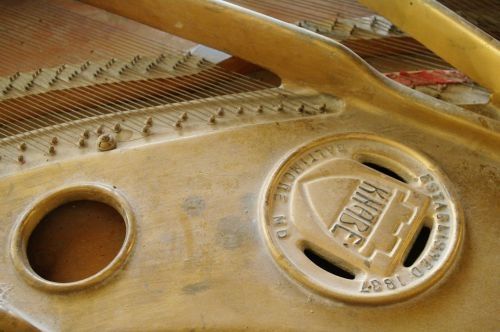
The next piano teacher was someone whose teaching methods really upset me. She wanted me to make a lot of extraneous motions with my arms when playing Chopin, and that simply isn't the way I am designed. So she used to force me physically, and she would actually hurt my fingers. Not only that, but she used a French method of counting which was totally foreign to me, and which I really detested. The result was that I almost gave up on music entirely. I told my mother I didn't want to study under this lady anymore, but my mother refused to let me quit. She later told me that she had to make sure I didn't win. As it turned out, that was a complete misinterpretation of what was really going on in my head. But not long after, for a reason I can't remember, I was no longer studying under her.
My next teacher was Barbara Buckbee. She was the other excellent teacher I ever had. She was a spinster, and had had polio as a child. As a result, she had to walk with crutches. She was able to drive in spite of this problem. She had two grand pianos in her studio, and she was within walking distance of my home.
After I had studied under her for awhile, she said I needed a new recital piece. Just the day before, I had heard Rachmaninoff's famous Prelude in c# Minor for the first time, and said to myself, I HAVE TO LEARN TO PLAY THAT. So imagine my surprise when she suggested that should be my new recital piece! I hadn't said a word to anybody about what I wanted. The piece was quite a bit more technically difficult than anything I had played before.
At the time, my mother was attending college, and I was on early session at school, so I got home hours before she did. I practiced the piece in secret.
On the recital day, my parents had yet to hear what I was about to play. The recital was held in a small concert hall that had a 6'4" Knabe grand. When my parents looked at the program, they had no idea what the piece was. And then I played it, and they were stunned! (Nice surprise as far as I was concerned!)
After the recital, my father said, "I guess we need to get a new piano." So they went out and bought a 5'8" Knabe grand. I wanted a 6'4", and we had room for it in the house, but that isn't what they bought.
The Knabe has a wonderful, rich tone. It is the piano used by the Metropolitan Opera. I have never heard another piano with tone like that in the lower notes. Unfortunately, Knabe went out of business some years back, which limits an opportunity to get one for myself. I was able to get a used one from someone I knew who had bought it and renovated it. He sold it to me for what it cost him. Currently, the piano is out of tune :( and I have lost my tuning hammer. Before it will stay in tune, I will have to have some pins replaced. Maybe someday...
The photo shows the inside of my piano.
Prelude in c# Minor - Sergei Rachmaninoff
I don't have a recording of me playing this piece, so I am giving you a favorite performance.
The music I have has four staffs on each line, which was a complication for me already. Other editions don't do this. But the only way I could perform it was to memorize it early on.
This piece was so popular that whenever Rachmaninoff performed on the piano, people demanded that he play it. I can see why.
What Kind of Music Do You Like Best?
What is your favorite kind of music?
College
The other piece I wanted to learn
I was seriously considering majoring in music in college. The first year, I went to college away from home and declared a major in physics because I am fascinated with nuclear physics. However, that proved to be a bad choice. This was partly because I discovered I didn't like a lot of the things I had to study, like vectors. I also got experimental results so bad that even the Finagle factor didn't work! Another reason was that I didn't want to give up my other interests and turn into that much of a specialist. Among other things, I was now fascinated with foreign languages, and I didn't want to give up music. I had a good teacher the first year, someone who gave me another really important clue. Playing the fingers fast makes the notes loud. It's not about how fast you play the fingers. It's about how rapidly you can coordinate successive fingers. I don't remember offhand what I learned that first year; I'll have to think about it.
The following year I switched colleges, and had a woman as a private teacher I wasn't all that fond of. There was nothing overtly wrong, we just didn't connect. She told me I shouldn't major in music, and I didn't appreciate that. I WAS studying on the first year level for a major. The first year I learned Beethoven's Pathetique Sonata, which I really like. The second year, I had another bit of serendipity. I had decided I wanted to learn Rachmaninoff's Second Piano Concerto. She assigned me the second movement. I never did learn to play it. It was about that time that life started getting even more complicated than it had been (and it had been plenty complicated before). I also took two semesters of organ, which I also dearly love. And two semesters of music theory, which I thoroughly enjoyed, and which information I still use. It was there that I learned I have perfect pitch, though partly it was trained deliberately on my part. This was because my parents' piano was perpetually flat, so I was always slightly flat. As soon as I figured this out, I simply adjusted the pitch slightly upward and was dead on each time after that. This was the first thing the teacher did, and then she would play the note on the piano.
Eventually, I switched colleges again, and this time, I wasn't studying music anymore. While I was attending that college, the Roe v. Wade abortion decision was handed down. That upset me so much, I couldn't even LISTEN to music for a couple of years.
Children and Music
By the time I got my bachelor's degree (in art), we had four children. Two of them were adopted. At some point, I started making sure that the radio was on to a classical station, or there were CDs playing, all day long. I didn't feel it would be right to force them to start studying while they were very young, and we didn't have the money for lessons for all of them anyway. I did sign some of them up for classes occasionally.
Eventually, I told each of them that one of the requirements we had for them was to learn to read music, and to learn to play one instrument of their choice. Our oldest had already taken guitar lessons, and I didn't include him because he was so much older than the others. Our older daughter learned to read music in two days, using the computer. Our son just below her took three days. That's OK. He can read orchestral scores and conduct from them, from scratch. I don't know to what extent everyone else reads music, but they do somewhat. Our daughter chose flute, and the next son initially chose piano. I'll tell you his story in a minute. The next one chose trumpet, which is interesting, because his favorite kind of music is soft and slow. Then the other daughter chose flute to begin with and then switched to viola. The next one chose French horn, and the final one chose classical guitar.
Our French horn player has beautiful tone. Eventually, I was able to get him a really decent horn for not much money. Several of the children played in the church orchestra, and that is where we met the man who taught him French horn for awhile. But I wasn't happy with him because he told our son that he had no talent because he couldn't read music very well. I thought that was pretty shabby, and I told our son I really wanted to find another teacher for him because of it. Our son didn't agree, but he didn't end up taking lessons for much longer. He was the only one who tried out for the Philharmonia and didn't make it in; he got alternate. Two others did play in the Philharmonia. A couple of them also played in the Simphonie da Chiesa (a Christian orchestra) and our string players played in Junior Strings and went to music camp.
Our youngest is very good on classical guitar, and was offered a scholarship to study guitar in college. However, he had other plans. Perhaps he will go back to it eventually.
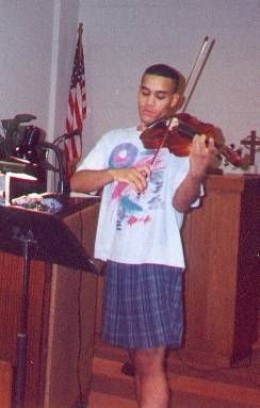
Our Musical Star
His stage name is Anthony Allen Taylor. He first asked to study piano when he was about 13, and at the time, our piano was stored in the barn, and I had taken it apart because I was refinishing it. The October flood caused the roof to leak, and it dripped right on the hammers in the middle octave, causing the felt to come unglued. So it wasn't playable.
So when he asked, I explained I didn't know how to provide him with an instrument because things were getting financially worse over time. So I said we should pray for a piano for him. This was on Monday. We were alone together in the car, and we told no one about this. On Friday, my mother-in-law called and said "Hildegard wants you to call her." So on Sunday, I called Hildegard, and she said, "The Lord told me to give you my organ." She didn't have a piano. So I went out and I said to our son, you remember we decided to pray for a piano? Will, will an organ do?
I sent some of the boys over to pick it up. Within three weeks, our son could play the Prelude in C from the Well Tempered Clavier by Bach, and a few weeks later, he was playing the Toccata from the Toccata and Fugue in d by Bach. After that, not much happened for a few months, and then he came to me, and he had found the 3/4 size violin I had gotten someplace for $25, and he said, I want to study violin. So I said to him, we can't afford lessons, and I don't know the first thing about the violin.
So he sneaked behind my back and found a woman who would teach him for free. All I had to do was provide transportation. He had four lessons from her, and then she told us she was going to Oberlin, so she wouldn't be able to teach him anymore, but she had told her teacher about our son, and we met with him, and he agreed to teach in exchange for barter. Not long after that, our son joined Junior Strings, and made it into the third of the top three orchestras. He also played his first recital, music memorized, good intonation, and vibrato he had taught himself.
Within two years, he had made the top orchestra. They tour quite a distance, and he got to tour with them a couple of times.
After that, his teacher said that he had been offered a scholarship to attend the New World School of the Arts, a full-expense scholarship. By this time, he was also playing viola, so he went there as a viola major. He was there a year, but it didn't work out, and in the meantime, someone snagged him to sing bit parts in operas, so when he came home and went to the university, he became a voice major.
In the meantime, he also studied trombone, and his trombone teacher suggested he form a swing band, so our son recruited 24 high school level jazz players, found a place to rehearse, and nabbed the local junior college jazz teacher to rehearse them. After a semester, they participated in a citywide jazz festival and played three pieces. After that, our son said he didn't have time to keep the group together, so it fell apart.
Fast forward a little bit (and drop back later). He also plays piano (self-taught) and handbells, and conducts. He taught choruses in public school for one year, and started in October because the other teacher abruptly quit. The choruses were a mess! However, he got them into shape, and two of them won second place in a regional competition. Their performances were delightful, and included many types of music. At the last performance, he had 16 soloists whom he had taught himself in his "spare" time, and they were very good!
More about Anthony Allen Taylor
By this time, our son was no longer living at home. A pianist who was playing for the chorus classes at the university attracted his eye, and they ended up getting close, and wanted to get married. Two difficulties arose. One was that she was Chinese, which meant a different culture to deal with, and the other was that her family was Seventh-day Adventists. I'll talk about this group another time. For now, suffice it to say that it proved to be a disaster for him. They did get married, and our son wasn't willing to do what he needed to do to make it work, given her culture. Eventually, they divorced.
In the meantime, he got a degree in music performance, and has been trying to get into opera as a career, but it has never really worked out. He is still trying. And now he has a daughter whom he adores, but that complicates things.
His daughter is only 3, but already, she can sing several songs in tune. She is also bilingual and is already learning to read.
Musical Instrument
Tell me about your own background in music.
Do you play a musical instrument, or do you sing?
What Else We Did
Our activities weren't restricted to what I have already explained. We did a number of other things as well, related to music.
Whenever I took a child to a lesson, I sat and listened intently to everything that happened. The result was that I now know much more than I once did. I can play a couple of things on classical guitar, for instance, and I can play a scale on the violin. One time when our son the violinist was struggling to have a piece ready in time for a recital, I asked him to let me help him. He responded, "You said you don't know anything about the violin." I said, "I do now." He didn't believe me, so I borrowed his violin and his recital music and went up on the balcony and started working on it. After awhile, I could play a few measures. I think he probably listened to me, but I don't know for sure. So I went back, and said I could play the first few measures. He said, "It's in fifth position." I said, "I know. I played it in fifth position." He didn't accept my help, and he was ready, but he never told me I didn't know anything about the violin anymore.
I also got some recorders for some of the children, and we used to go to Recorder Society meetings once a month, where we would sight-read music and play together as an ensemble. It was fun, and the kids could do it.
So that meant that by that time, I was playing four musical instruments. I have our children to thank for that.
Some of us also sang in the Masterworks Chorale. We mostly sang the great Christian choral works. One time we sang Carmina Burana. That was fun! Some of the other members didn't like our children being there because they were children, and because our children could read music, and they couldn't. But we stood our ground. Being allowed to let our children do legitimate things against the objections of some adults has always been a problem. So many children are ill behaved (ours weren't). So they just lump everyone in together.
Folk Music and Dance
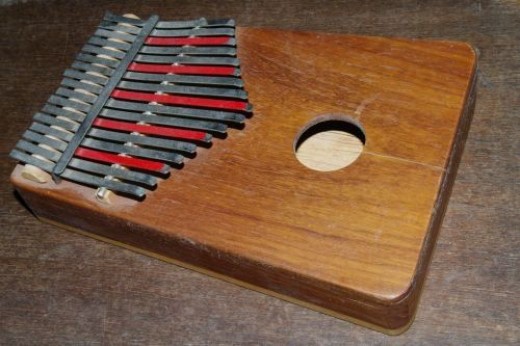
The musical instrument is a thumb piano from Africa. There are several names for this instrument, depending on the language. I like the name Kalimba.
The metal reeds are tuned to a major scale. I like to improvise on this instrument. I will write a Lens about various folk instruments, with video examples.
Over the years, we had our children involved in a number of other musical activities. For example, a couple of them learned to yodel (and made the newspaper with a picture). Some of them studied Flamenco dance. I took them to performances of the African dance company in town. We would go to the Greek festival and participate in the Greek dancing. Some of us also studied Hawai'ian dance for awhile. I don't remember what all we did, but that's a good sample.
When our son formed the swing band, two others of our sons played in it.
My philosophy was that in most cases, if you don't introduce them to music as children, they won't do anything with it as adults, even though they could. Most adults think they can't start music from scratch.
The Best Classical Radio Station in the World - Available in several internet streaming formats, and by satellite
This station is by far the best for programming I have ever found! Bar none.
They get no public funding or large grants. They are totally listener-supported. They do not broadcast any propaganda masquerading as news; they are totally apolitical. They have a budget of hundreds of thousands of dollars, and they get that much in donations when they fundraise. They have around 11 repeaters, and offer their signal free of charge to any station that wants to re-broadcast it. They have several that do.
They are just good music, all the time.
The only drawbacks I have found is that they play way too much Copland, and not everything they play on Wavelengths is worth listening to. But I listen to them whenever I am at home. Try them out!
- WCPE - The Classical Station
Classical music, 24/7 (except during fundraising).
A Recent Adventure
Yo-Yo Ma
Anthony Taylor works in a local specialty market and one day not long ago, he was in the store, and Yo-Yo Ma walked in! They got to talking, and Ma ended up giving him two tickets to his performance that evening. So he called me and we went.
Ma's playing is superb! His knowledge of various styles and repertoires has to be encyclopedic, and he plays a lot of different styles, and very sensitively. He is vibrantly alive and draws you into the depth of his music. Watching him, you know that playing, for him, is as easy as falling off a log. Still, there is that energy, and it shows.
After the performance, we were able to go backstage and meet him. He was most gracious, and posed for pictures with us. I have one of those photos someplace...
This probably won't be the last great adventure we have, but it sure has been a highlight for our lives.
Yo-Yo Ma performances - The Swan by Saint-Saens
Yo-Yo Ma & Bobby McFerrin
Bobby McFerrin is a real trip, no matter what he does! I saw him conduct a symphony orchestra, and he is SO expressive in his conducting style! He is a joy to watch. And Yo-Yo Ma, is there any kind of music he hasn't played?
With the Silk Road Ensemble
Yo-Yo Ma captivates young people in New York.
Libertango - Yo-Yo Ma Nestor Marconi Astor Piazzolla
Elgar Cello Concerto
Never Too Late
If you are an adult who loves music and you wish you could play something, you need to read this book!
John Holt was a schoolteacher who got disgusted with the system, and ended up founding a group called Growing Without Schooling. His philosophy was that children naturally want to learn, and if allowed to learn however they learn best, they will be educated. His method is known as unschooling. I don't entirely agree with him, but a certain amount of unschooling is a good idea, because you can lead a horse to water, but you can't make him drink. If a child really doesn't want to learn what he is being taught, he will forget it at the first opportunity.
Holt's second avocation was cello. He started studying cello at the age of 40. Cello is a fairly challenging instrument to play, but he was able to play well enough to play in an amateur string quartet, and had a lot of fun.
John Holt's message: it is never too late to learn a musical instrument, or anything else, for that matter.
Available on Amazon.
Purple Star
Thank you to everyone who was involved in my getting a Purple Star! I deeply appreciate it.
